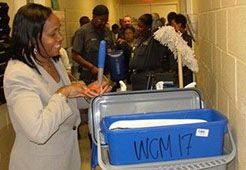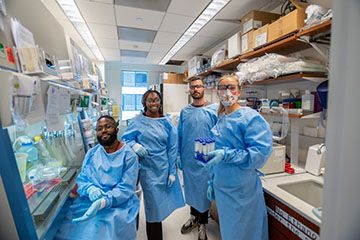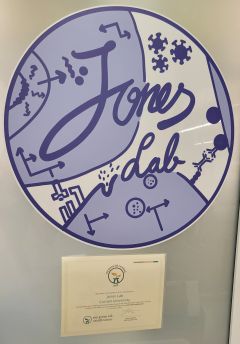30% of Municipal Solid Waste is compostable food and yard waste.
Departments are changing how they work to reduce energy and waste.
A group of Weill Cornell Medicine employees.
Employees throughout the campus, our Green Leaders, are creating Green Teams that promote new practices, reduce waste, and lower energy use. Several departments share their experiences as they change the way we do business. If you have a green initiative, please share your story with us!
Offices
Department of Anesthesiology
The Department of Anesthesiology installed new multifunction Xerox machines, which allow for “toner saver” printing, which makes lighter copies using less toner. These machines also act as printers and users can send high volume, multi-page documents directly to the copier for double sided printing. The machines also provide scanning and emailing features which reduces paper use. The machines are set for sleep mode to save energy when not in use. The department replaced several fax machines as a result of the upgrade, using the new copiers for network faxing. This not only saves energy by having less equipment, the department realizes additional savings with lower monthly phone charges for the reduced number of analog phone lines.
Department of Psychiatry
The administrative staff members within the Department of Psychiatry have been developing green practices for their offices since January 2008. They have reduced paper usage, started recycling, and have monthly meetings to continue to make changes in office operations. They have posted instructions for double sided copying directly above copy machines to encourage using less paper.
Office of External Affairs
The Office of External Affairs has upheld a long-term commitment to fostering sustainability initiatives. We have harnessed the Earth Day Motto of “Think Globally, Act Locally” by focusing on the reduction of Styrofoam and paper cup use in our office. Each new employee receives their own Weill Cornell Medicine branded coffee mug, which reduces the amount of trash that goes into the landfill while cutting costs in the long term. When the City of New York implemented the commercial building recycling laws, our department was proactive in creating a comprehensive recycling program. External Affairs has increased awareness for the need of thoughtfulness in energy use as an active participant in the annual Weill Cornell Medicine Un-power Hour and raffle. Tom Nichols and Clare Casey are the “Green Leaders” for External Affairs.
Radiology Sustainability Initiative
A dynamic coalition of professionals from Weill Cornell Imaging at NewYork-Presbyterian has come together with a clear mission: to revolutionize their practice through proactive sustainability measures and educational outreach. They start by ensuring every new team member is equipped with a personalized mug and thermos. This is a tangible step to reduce single-use coffee cup waste and minimize environmental impact as they transition to bottle-less water stations.
These initial efforts prompted a comprehensive reevaluation of breakroom supplies; now, they exclusively procure recyclable or compostable items for their staff. Collaborating with the WCM Office of Energy and Sustainability, they have diligently labeled all recycling and trash bins to ensure uncontaminated waste streams.
Currently, they are spearheading a Sustainability Segment in their employee newsletter to encourage information sharing, provide practical tips, and introduce new eco-friendly initiatives. They are shifting their practices away from CDs to minimize waste and making significant strides towards going paperless by transitioning from faxed documents to e-based solutions.
"With the enthusiastic support of our team, we are poised to move towards a greener future. We are excited to continue our journey of sustainability and innovation." Said Justine Pogorzelski, MHA.
Facilities
Housekeeping and Custodial Services

The Director of Housekeeping and Custodial Services inspecting the new cleaning products.
When Weill Cornell Medicine assumed responsibility for housekeeping services in the Weill Greenberg Center and the research buildings in 2008, Housekeeping and Custodial Services took that opportunity to transition to green cleaning processes throughout the campus. All of the routine cleaning products used since on campus are approved by Green Seal, which is an independent, nonprofit organization that sets environmental standards and awards a Green Seal of Approval to products that are friendlier to the environment. The impact of converting is enormous considering the quantities of cleaning products used annually. Flore Berger, Director of Housekeeping and Custodial Services, has led the initiative to greener cleaning not only for the planet, but also for a better working environment for employees and staff. Ms. Berger noted that “The Green Seal cleaning products give off fewer fumes and our vacuum cleaners use HEPA filters to reduce dust.” Moreover, Housekeeping has installed special dispensing stations for cleaning products to dispense the correct concentration of cleaning solution and so avoiding waste. The special flat mops used by the housekeeprs hold cleaning solution within the handle for direct application, so that compared to traditional mops, 80% less chemical waste is generated. The green cleaning approach has been expanded in July 2009 to the rest of the campus.
Laboratories
WCM Postdoc Green Lab Initiative
In the vibrant halls of Weill Cornell Medicine (WCM), a group of passionate postdocs is leading a quiet revolution for sustainability. Meet the Green Lab Initiative (GLI), a team of volunteers within the Postdoctoral Association (PDA) committed to greening their workspace. Their goal? To build a community of postdocs interested in eco-friendly practices and to make everyone aware of the environmental impact of lab work.
The GLI is all about action. Teaming up with the Office of Energy and Sustainability, they facilitate workshops on waste management, helping postdocs better understand what can be recycled and how to reduce waste. They also collaborate with Memorial Sloan Kettering’s Climate Action Committee and Rockefeller University’s Sustainability Committee to organize dynamic events such as "Escape the Lab: The Sustainable Escape Room Experience." These events are a fun and engaging way to teach sustainable practices across the three institutions.
The GLI is also provides advice to other committees on how to make their events greener. By sharing knowledge and working together, they're spreading a culture of sustainability throughout the postdoc community.
If you want to know more about the PDA Green Lab Initiative, do not hesitate to reach out to initiative lead, Juan Rodriguez-Alcazar at jfr4001@med.cornell.edu!
Brad Jones Lab

Members of the Jones Lab in their tissue culture room.
The Brad Jones Lab, in the Department of Microbiology and Immunology, is the first lab on campus to participate in the My Green Lab Certificate program. After filling out a lab survey, they received a tailored feedback report. They then decided on the key areas they wanted to focus on to make their practices more environmentally friendly. Their strategy involved appointing “Green Lab experts” for each of the key areas, who then lead to a month-long challenge to improve these practices (e.g. “freezer challenge” or “plug load challenge”). “This way, we’ve had a lot of fun and we already significantly cut down on plastic waste, improved recycling, eliminated confusion about waste and turning off/leaving on equipment, and meanwhile cleaned and reorganized our freezer space.” Said Noemi Linden, a PhD student in the group who’s coordinating the green certification efforts. In the beginnning of 2024, the lab took the the second My Green Lab assessment, after addressing the comments received on the first assesment, and obtained Gold Level Certification status. Congratulations to our first My Green Lab certified lab!
Clinical Spaces
Sustainability PeriOp group
The PeriOp Sustainability Group was founded in September 2022 as a partnership between the Columbia & Cornell Anesthesiology departments (John Mercer, MD and Nick Gadsden, MD from Columbia Anesthesiology, and Deirdre C. Kelleher, MD, Zachary A. Turnbull, MD, Lindsay Kanner, RN from Cornell Anesthesiology). Additional doctors, nurses, and administrative staff joined the group later and a larger working group was created. On the WCM side, the sustainability efforts are led by Dr. Deirdre C. Kelleher, MD, Assistant Professor of Clinical Anesthesiology and Anesthesiology Sustainability Chair.
Although the group’s initial goal was to decommission the N2O lines in anesthesia rooms, the scope of the work has now expanded beyond anesthesiology to reduce waste and energy in operating rooms.
The group has been working on several sustainability projects, including the following:
- Reducing Plastic Waste Related to Nasal Cannulas.
- Operating Room (OR) Attire: The group’s health and safety data demonstrated that disposable caps in perioperative spaces have no added benefit, so they were able to change the NYP policy on OR attire. Individuals can now choose to wear a clean, reusable cloth cap instead of a single-use disposable one. Not only is this a win for the environment, but it's made procedural areas much more colorful, with everyone showing off their personality and creativity in their daily caps!
- Desflurane: The anesthesia group reduced the use of this general anesthetic substantially over the past five years because even small amounts were leading to substantial CO2 emissions and increasing costs. As of 2024, WCM is now a desflurane-free institution!
- Reducing Inappropriate Use of Red Bags and Sharps Waste: The Periop team is working closely with NYP and WCM's waste management vendor, Daniels Health, to reduce red bag and sharps bin overuse. On the anesthesia side, all sharps containers were switched from large open-mouthed bins to smaller bins with a safety flip mechanism. This safety device acts as a deterrent from individuals throwing in full procedure trays, gloves, gowns etc, which were commonly found in the larger bins.
Be the first one to send us a green story pertaining clinical spaces.


